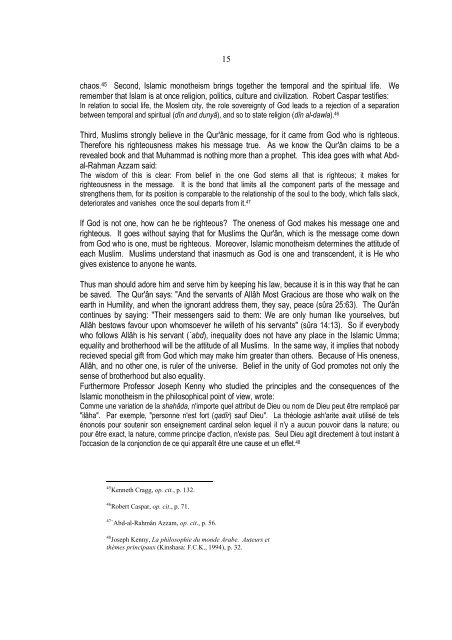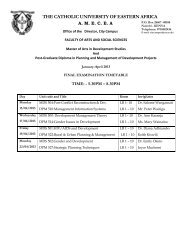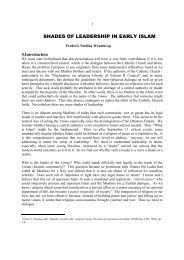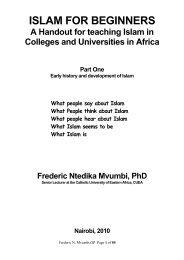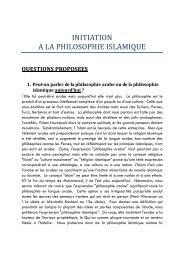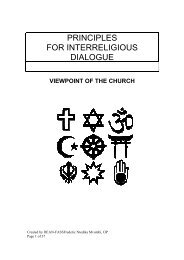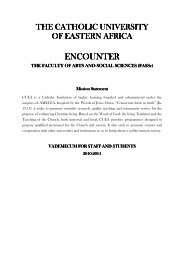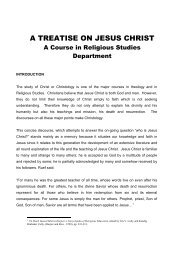INTRODUCTION TO ISLAMIC THEOLOGY.pdf - CUEA
INTRODUCTION TO ISLAMIC THEOLOGY.pdf - CUEA
INTRODUCTION TO ISLAMIC THEOLOGY.pdf - CUEA
Create successful ePaper yourself
Turn your PDF publications into a flip-book with our unique Google optimized e-Paper software.
15chaos. 45 Second, Islamic monotheism brings together the temporal and the spiritual life. Weremember that Islam is at once religion, politics, culture and civilization. Robert Caspar testifies:In relation to social life, the Moslem city, the role sovereignty of God leads to a rejection of a separationbetween temporal and spiritual (dîn and dunyâ), and so to state religion (dîn al-dawla). 46Third, Muslims strongly believe in the Qur'ânic message, for it came from God who is righteous.Therefore his righteousness makes his message true. As we know the Qur'ân claims to be arevealed book and that Muhammad is nothing more than a prophet. This idea goes with what Abdal-RahmanAzzam said:The wisdom of this is clear: From belief in the one God stems all that is righteous; it makes forrighteousness in the message. It is the bond that limits all the component parts of the message andstrengthens them, for its position is comparable to the relationship of the soul to the body, which falls slack,deteriorates and vanishes once the soul departs from it. 47If God is not one, how can he be righteous? The oneness of God makes his message one andrighteous. It goes without saying that for Muslims the Qur'ân, which is the message come downfrom God who is one, must be righteous. Moreover, Islamic monotheism determines the attitude ofeach Muslim. Muslims understand that inasmuch as God is one and transcendent, it is He whogives existence to anyone he wants.Thus man should adore him and serve him by keeping his law, because it is in this way that he canbe saved. The Qur'ân says: "And the servants of Allâh Most Gracious are those who walk on theearth in Humility, and when the ignorant address them, they say, peace (sûra 25:63). The Qur'âncontinues by saying: "Their messengers said to them: We are only human like yourselves, butAllâh bestows favour upon whomsoever he willeth of his servants" (sûra 14:13). So if everybodywho follows Allâh is his servant (`abd), inequality does not have any place in the Islamic Umma;equality and brotherhood will be the attitude of all Muslims. In the same way, it implies that nobodyrecieved special gift from God which may make him greater than others. Because of His oneness,Allâh, and no other one, is ruler of the universe. Belief in the unity of God promotes not only thesense of brotherhood but also equality.Furthermore Professor Joseph Kenny who studied the principles and the consequences of theIslamic monotheism in the philosophical point of view, wrote:Comme une variation de la shahâda, n'importe quel attribut de Dieu ou nom de Dieu peut être remplacé par"ilâha". Par exemple, "personne n'est fort (qadîr) sauf Dieu". La théologie ash'arite avait utilisé de telsénoncés pour soutenir son enseignement cardinal selon lequel il n'y a aucun pouvoir dans la nature; oupour être exact, la nature, comme principe d'action, n'existe pas. Seul Dieu agit directement à tout instant àl'occasion de la conjonction de ce qui apparaît être une cause et un effet. 4845 Kenneth Cragg, op. cit., p. 132.46 Robert Caspar, op. cit., p. 71.47`Abd-al-Rahmân Azzam, op. cit., p. 56.48 Joseph Kenny, La philosophie du monde Arabe. Auteurs etthèmes principaux (Kinshasa: F.C.K., 1994), p. 32.


